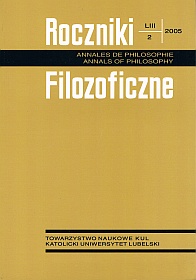Kilka uwag o metodach w filozofii
(przeł. Agnieszka Lekka-Kowalik, Rafał Lizut)
Abstrakt
The paper argues that a good philosophical investigation employs various methods, but there exists a constant temptation in philosophy to become obsessed by one method as opposed to another. It was once supposed to be two rival methods for practicing analytical philosophy: the ordinary language method and the formal logic method. Yet, those methods were not genuinely rival, as they were usually used to answer different questions. A method supposed to be in opposition to the analytic methods was developed by phenomenology. The phenomenological method — suitable for analyzing phenomena of our own experience — is not however applicable to certain important philosophical issues. One of them is: how do we get from sound to meaning? The answer to this question provided by the Heideggerian method proves that phenomenologists cannot hear the question and cannot grasp the answer given by the author, for they mistakenly think that the question: “what is the logical relation between sound and meaning” is reducible to the phenomenological question; how does it seem to the agent. The same problem arises with regard to social reality. Thus, the phenomenological method is inadequate to answer such questions, because it does not allow to recognize the distinction between brute facts and reality built upon them (such as institutional facts), and logical relations between them. Phenomenology will enable us to begin the investigation, but in order to keep going with the investigation we should go beyond the level of phenomenology to the level of underlying logical structures.
The lesson to be drawn from the above considerations is that there is a variety of methods suitable for philosophical investigations and the general principle is to let the nature of the problem dictate the method for its solution rather than letting the nature of methods dictate the sort of problems regarded as important.
Copyright (c) 2005 Roczniki Filozoficzne

Utwór dostępny jest na licencji Creative Commons Uznanie autorstwa – Użycie niekomercyjne – Bez utworów zależnych 4.0 Międzynarodowe.





